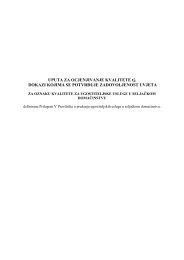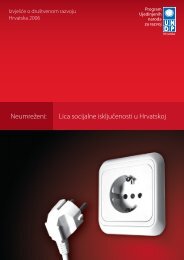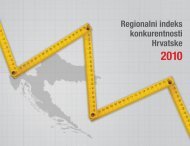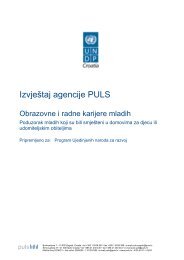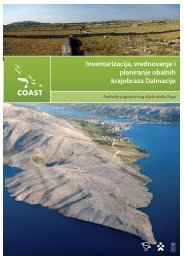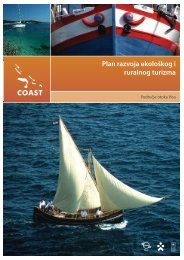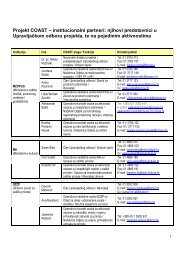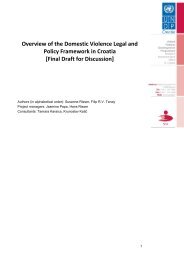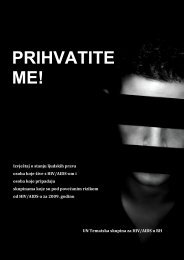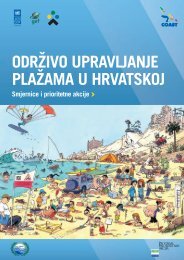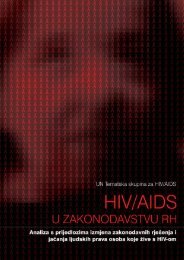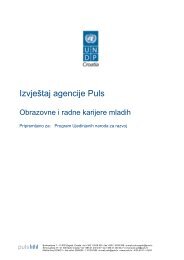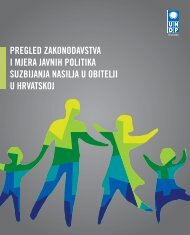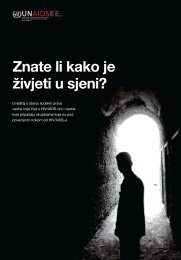THE SOCIALLY EXCLUDEDCHAPTER 3istered with the employment bureau and receive anominal salary (280 HRK) until they find a job. Theyt<strong>end</strong> to receive this compensation for life, becauseemployment opportunities are almost non-existent.In order to provide at least minimal financial securityfor their child, many parents/guardians recall theirchild’s/ward’s working ability so that they can receivepersonal disability compensation (1,000 HRK) and,after their death, the right to family pension. Individualswith no family live in students’ homes during theireducation, and in residential institutions after theyfinish their schooling.The Act on Professional Rehabilitation and Employmentof Persons with Disability was adopted in late2002 with the purpose of including people with disabilitiesin the labour market through a number ofincentives. According to the opinion of organizationsrepresenting people with intellectual disabilities, thepossibility for employment is almost non-existent. 80Namely, in the case of people with intellectual disabilities,the measures stipulated in the act are notappropriate in view of their needs. The Act enablesco-financing for the job coach who provides supportto a person with disabilities in the workplace howeverthe coach has to be an employee of the companywhere the person with disabilities is working. Peoplewith intellectual disabilities, especially with moresevere ones, do not gain employment in the openlabour market but rather realise their right to workonly within the framework of sheltered conditions.Unfortunately, employment under these shelteredconditions falls under the responsibilities of the systemof social welfare and not the system of economyand labour, which puts the person in the position of abeneficiary of social welfare services.3.4.6 Access to TransportationIn the City of Zagreb, the city transportation serviceZagrebački električni tramvaj (ZET) has graduallystarted introducing modern buses and trams modifiedto suit the needs of people with disabilities. TheCity of Zagreb also allows individuals with intellectualdisabilities, who are members of the Association forHelping Persons with Mental Retardation, to havefree annual transportation. In smaller towns, wherepublic transportation is in the hands of marketselectedconcessionaires, there is no free service.Organized transportation to schools in only availablein large educational centres (special schools) whichown vehicles and have staff members responsible fortransporting students.3.4.7 Access to Housing and BasicInfrastructureThere are three forms of housing available for personswith intellectual disabilities: a family (eitherbiological or foster-family), residential institutions,and, more recently, supported community-basedhousing programs (Homes for Indep<strong>end</strong>ent Livingand organised housing). If an individual lives with afamily, the quality of housing dep<strong>end</strong>s on the conditionsand status of that family. After the death of theindividual’s parents, he or she will most likely be institutionalized.An alternative to institutionalisation iscommunity-based supported housing, which enablesthe person to continue living in their residence whilereceiving support. People with intellectual disabilitieswho live in residential institutions, live under the con-80 <strong>UNDP</strong> (2006b). Resreach in Social exclusion in <strong>Croatia</strong>: Groups at an increase risk of Social exclusion – focus groups. <strong>UNDP</strong>, Zagreb,<strong>Croatia</strong>. Pg 17.63
CHAPTER 3THE SOCIALLY EXCLUDEDditions that their institution can provide (for example,several people share a room, common bathroomsand toilets). The individual with the disability doesnot decide where he or she will live, which is a decisionleft to members of their family (if the person liveswith one) or the social welfare centre. Since there isnot enough alternative accommodation, people withintellectual disabilities are mostly accommodated inresidential institutions.The issue of housing for those with intellectual disabilitiesis a serious problem, especially from the point ofview of de-institutionalisation. CSW need to work withthe local administration on providing housing withinthe local community, as is the case with veterans, orphans,and other socially vulnerable groups.disabilities are nominal members having no participationin the decision-making process. Clubs that organisea number of day-activities involve individuals living withsimilar disabilities, thus representing closed groups,which do not encourage wider social integration.While developing the program for community-basedsupported housing, the Association for Promoting Inclusionbegan building self-advocacy skills for people withintellectual disabilities. The result is the establishmentof the first and only Association for Self-advocacy in theregion. Individuals who are involved in the programmesof the Association for Promoting Inclusion play an activerole in all community activities, dep<strong>end</strong>ing on theirdesire to do so.3.4.8 Social TiesAt the national level, the <strong>Croatia</strong>n Association of Societiesfor Persons with Mental Retardation incorporates36 local societies which assist people with intellectualdisabilities. The organization was founded by parentsof children with disabilities, and those with intellectual3.4.9 Key ChallengesThe biggest challenge for people with intellectualdisabilities refers to developing a different approachto their representation. In <strong>Croatia</strong>, the representationfor these individuals is at an administrative level ofprocedure. The courts determine the legal capacity ofBox 5: Positive experiences of an NGOThe Association for Promoting Inclusion was established in 1997 with the purpose of encouraging the processof de-institutionalisation and development of community-based professional support services. In the process ofimplementing these objectives, the Association had good cooperation with the ministry responsible for socialwelfare, resulting in the first clients being deinstitutionalised in late 1997. As it was necessary to legalise theirlife in the community, at the initiative of the Association, the social welfare system introduced the possibility ofproviding care for people with intellectual disabilities in community-based housing alternatives.In mid 2000, the first Home for Indep<strong>end</strong>ent Living in <strong>Croatia</strong> was formed. At the time, there were already 23people living in rented apartments in Zagreb. Today, there are 105 adults with intellectual disabilities who livein 35 apartments/houses in Zagreb; Osijek, Bjelovar and Slavonski Brod. Two-thirds of the people with theprogramme of community-based housing were deinstitutionalized from long-stay residential social welfareinstitutions.In mid 2003, the Association launched as a pilot-project the first community-based group home for childrenwith disabilities. A new type of supported living was introduced in the system of social welfare in late 2003,called organised housing. In mid 2004, it became possible for NGOs to provide this form of care to people withintellectual disabilities.64The Association gives the greatest importance to the realisation of the rights of people with intellectual disabilities.Currently all the clients of our programmes are also involved in the programme of self-determination and selfadvocacy.This approach has enabled the establishment of the first Association for Self-advocacy of people withintellectual disabilities in <strong>Croatia</strong>, and the region. One of the realised rights was the right to live togetherand to marry. Six couples, now married, have obtained this right in court. In addition, at the initiative ofpersons with intellectual disabilities, procedures have been initiated to reinstate their legal capacity.



